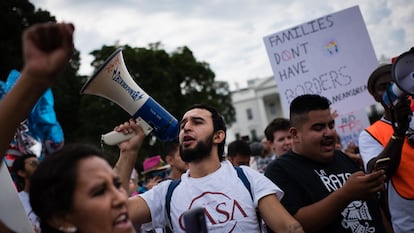Supreme Court lets Trump end humanitarian parole for 500,000 migrants
The court sides with the administration, leaving Venezuelans, Haitians, Nicaraguans, and Cubans at risk of deportation


The Supreme Court has given the U.S. administration the green light to end the humanitarian parole program that granted temporary residency to 500,000 migrants from Cuba, Nicaragua, Haiti, and Venezuela. The court thus responded to the Trump administration’s emergency appeal and leaves the beneficiaries without protection from deportation.
With its decision, the Supreme Court temporarily lifted the order of a district judge who had blocked the executive order signed by President Donald Trump on January 20 canceling the humanitarian parole program. Although the most recent decision lifts protections, the case has not ended and will now return to the 1st U.S. Circuit Court of Appeals in Boston.
The two liberal justices, Ketanji Brown Jackson and Sonia Sotomayor, dissented, warning that the majority had failed to consider the “devastating consequences” it will have on the lives of people legally residing in the country.
Humanitarian parole was a program devised by the Joe Biden administration to reduce the number of illegal arrivals and accommodate migrants fleeing countries in critical situations. Recipients were required to have a sponsor in the United States, and they received temporary residency and a work permit.
The Biden administration extended the program for Venezuelans in late 2022 and for Cubans, Haitians and Nicaraguans in January 2023. This reduced unlawful arrivals of hundreds of thousands of migrants at a time when failure by Congress to approve a reform of the immigration system had triggered a surge in irregular border crossings.
“I suppose that it is in the public’s interest to have the lives of half a million migrants unravel all around us before the courts decide their legal claims,” Jackson stated sarcastically in her dissent. She added that the decision “undervalues the devastating consequences of allowing the Government to precipitously upend the lives and livelihoods of nearly half a million non-citizens while their legal claims are pending.”
Migrants on parole fled situations of violence and economic crisis in their countries of origin. By losing their status, beneficiaries would be left with the options of self-deporting and returning to the countries which they fled, or staying and exposing themselves to detention and deportation by immigration authorities.
Earlier this month, the Supreme Court, which has a conservative majority of six justices against three progressive ones, had already authorized the government to cancel the TPS (Temporary Protected Status) program for 350,000 Venezuelans who were legally in the country. The TPS program offered temporary residency to migrants fleeing countries plagued by violence or natural disasters.
Sign up for our weekly newsletter to get more English-language news coverage from EL PAÍS USA Edition
Tu suscripción se está usando en otro dispositivo
¿Quieres añadir otro usuario a tu suscripción?
Si continúas leyendo en este dispositivo, no se podrá leer en el otro.
FlechaTu suscripción se está usando en otro dispositivo y solo puedes acceder a EL PAÍS desde un dispositivo a la vez.
Si quieres compartir tu cuenta, cambia tu suscripción a la modalidad Premium, así podrás añadir otro usuario. Cada uno accederá con su propia cuenta de email, lo que os permitirá personalizar vuestra experiencia en EL PAÍS.
¿Tienes una suscripción de empresa? Accede aquí para contratar más cuentas.
En el caso de no saber quién está usando tu cuenta, te recomendamos cambiar tu contraseña aquí.
Si decides continuar compartiendo tu cuenta, este mensaje se mostrará en tu dispositivo y en el de la otra persona que está usando tu cuenta de forma indefinida, afectando a tu experiencia de lectura. Puedes consultar aquí los términos y condiciones de la suscripción digital.








































